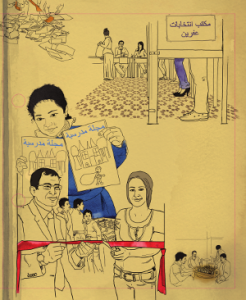
2013–2014
Democratization starts at the local level. If it doesn’t work there, it doesn’t work at all. Recent observations of the situation in Iraq, Egypt, Libya, and Tunisia respectively have shown that one structural problem of dictatorships is that there is no inclusion of citizens in decision-making processes at the local level.
During the »Arab Spring« revolutions activists created numerous informal and local councils that assumed responsibilities for civil-society tasks. Most activists had no prior experience building democratic structures. They were soon confronted with the limitations to their knowledge regarding these alternative structures. This inexperience made it easier for the new rulers to ignore the prime movers of the revolution and reestablish centralized structures.
The goal of our project was to point out democratic organizational possibilities to Syrian activists. We’ve prepared a number of suggestions as to how parties, unions, schools, universities, or associations could be structured to help promote the participation of party members, employees, students, and parents in decision-making and opinion-forming processes.
Project archive: local-democracy-for-syria.ezks.org/.
